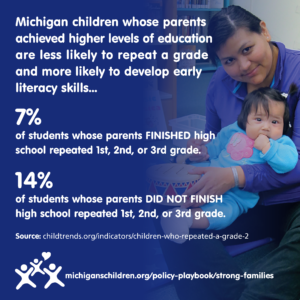Common sense and strong research demonstrate that the well-being of parents matters to their children’s social-emotional, physical, and economic well-being, to their children’s educational and life success, and to the strength and stability of families. Research shows that adversity in childhood affects the very architecture of the brain with lifelong implications.
Too many families face barriers to opportunities including poor mental health, violence, and economic instability, making it more difficult for their children to grow up physically and emotionally healthy and ultimately leading to greater difficulties learning, entering the workforce, and supporting families of their own. The families with the most challenges deserve consistent support to maintain environments and overcome stressful and traumatic experiences.
Families are stable when they are free from violence, substance abuse and mental health challenges; when they have parenting knowledge and skill as well as access to parenting supports; and when they have resources, and the skills to get resources, including adequate support for work and school.
- Preserve and expand state support for adult education programs that provide opportunities for young adults and parents to build literacy skills, earn a GED, and prepare for a career, improving workforce participation and family literacy rates.
- Invest federal and state funds into provider payments, family income eligibility, and other necessary investments for state-supported quality child care, enabling parents to access a job or job preparation and to keep their children safe in trusted environments that promote growth and learning.
- Ensure early diagnosis and treatment for developmental delays, physical or mental health challenges and other learning disabilities. This includes preserve and expand recent state investment in Medicaid and Early On Michigan and school-based health services.
- Increase state support to provide statewide access to voluntary evidence-based home visiting programs based on local needs assessments. These quality programs work with families exhibiting some risk in order to promote early learning, healthy child development, and improved birth outcomes.
- Increase state support for local abuse and neglect prevention councils, which build partnerships to assess needs, provide key trainings, and coordinate community support to prevent situations of toxic stress that lead to increased risk of child abuse and neglect.
- Increase state support for direct child abuse and neglect prevention services statewide, where grants fund programs designed to meet community-identified needs including for parenting classes, counseling, referrals, transportation and prenatal care.
- Leverage expanded investment in Early Literacy Coaches to collect data on barriers that parents/guardians have with implementing legally-required read-at-home plans so that knowledge of parents’ barriers can inform decision-making.
Caregivers of all kinds need access to services and programs to support their families’ overall success and help maintain family stability, including keeping children and youth out of the foster care system.
- Expand state funding for improving court capacity to appropriately respond to child, youth, and family instability, including through problem-solving courts which help parents and young adults receive the treatment they need to avoid losing custody of their children and spending time in jail or prison, and through community-based Infant-Toddler Court Teams (ITCT).
- Supplement recent federal funding to create a kinship navigator program for relative caregivers that provides the services and supports families need.
- Ensure that financing systems are sufficient to enable both formal and informal kinship caregivers to access supports needed to meet the needs of the children in their care, which can help maintain important relationships and mitigate trauma.
When we decide to separate families, we bear the responsibility to definitively say that children and youth, and often their families and caregivers, are doing better with system attention than they would be otherwise, regardless of where they are born or currently living.
- Include more citizen voices in Michigan Department of Health and Human Services (MDHHS) Citizen Review Panels and require public discussion of panel findings in the legislature and state agencies to ensure that state efforts around prevention, Children’s Protective Services, Foster Care, and Adoption, and Child Fatalities Panels are effective and well-informed.
- Craft strong and independent mechanisms for grievance and oversight within the Michigan foster care system, including by expanding access to child welfare complaints and corrective actions taken for independent evaluators; mandating public responses from MDHHS and appropriate Courts to all recommendations made by Foster Care Review Boards; and other reforms that would strengthen provisions of the Foster Child and Parent Bills of Rights.
- Strengthen the recently passed Children’s Assurance of Quality Foster Care Act by adding reporting requirements about child welfare complaints and corrective actions taken. Make these available to an independent evaluator like the Foster Care Review Boards to ensure that the voices of citizens in the system are fully acknowledged.
- Ensure that state task forces analyzing child welfare and foster care disparities and outcomes include the root causes of family removals and barriers to reunification, including poor or substandard housing, substance abuse, and mental health, in their analyses. Existing data should be reviewed, research partnerships should be supported, and constituent voice utilized.
- Expand Court-Appointed Special Advocates (CASA) coverage statewide to allow all children in the court system to have access to that resource. This expansion could begin by ensuring access in Wayne, Oakland and Macomb counties.
- Create an enhanced child care support system for relative caregivers and other families in the foster care system that includes improved rates and social-emotional supports.
- Improve legal representation for children, youth and caregivers in the foster care system through consistent support of Legal Guardians Ad Litem (LGALs) by utilizing available federal match, expanding state funding, as well as increasing training and documentation requirements for courts.
- Expand effective home visiting programs beyond limited availability in select counties to full statewide access, including parent-to-parent therapies, and for families involved with the child welfare system.
Take a Deeper Dive and explore these Issues Briefs by Michigan’s Children:
Learn how public policy decisions impact Michigan families and their children in these Spotlight stories and other reports by Michigan’s Children.


